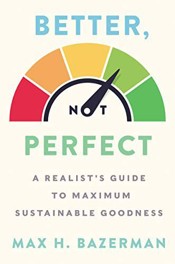Better, Not Perfect: A Realist’s Guide to Maximum Sustainable Goodness

This book was written by Harvard professor as a paean to Utilitarianism. That’s a philosophy that says every decision we make should be designed to provide the greatest possible value to the most people.
Pure utilitarianism would be tough to achieve, and that’s conceded in the book: we try to be perfect, but how do we just make better decisions to improve the world a little bit.
The second half of the book provides four strategies:
- Reducing tribalism; stop thinking in terms of what would benefit your own “in group” and expand your thinking to more people
- Making better use of your time; learn what provides value and what doesn’t
- Avoiding waste
- Donating to charitable causes more effectively
Along the way there are long discussions about effective altruism and animal rights (he’s a vegetarian; there’s a lot in here about kindness to animals).
It’s certainly interesting. The author peppers the text with lots of anecdotes, many of them personal. Also, he quotes that standard cadre of cognitive psychology books – he takes a lot from Thinking, Fast and Slow, for example.
All along he’s pursuing what he mentions in the subtitle: “maximum sustainable goodness.” How do we just become better people who benefit the world over the long term.
I enjoyed it. It was never boring, but the second half is much better than the first.
Book Info
- I have read this book. According to my records, I completed it on .
- I own an audio copy of this book.